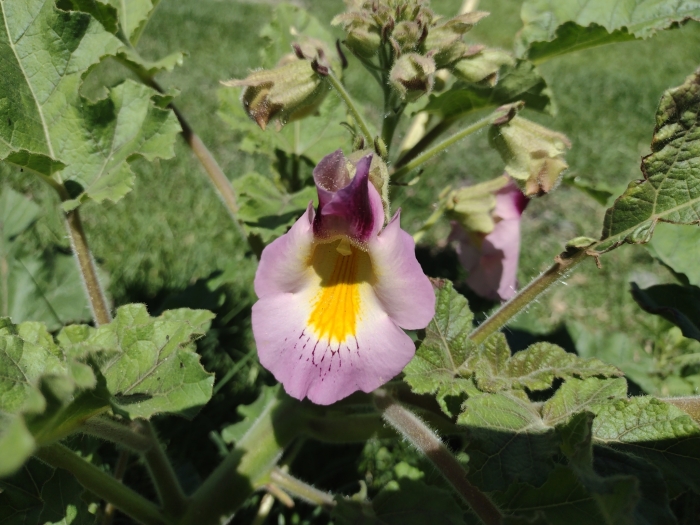Doubleclaw
(Proboscidea parviflora)
Doubleclaw (Proboscidea parviflora)
/
/

Alexis López Hernández
CC BY 4.0
Image By:
Alexis López Hernández
Recorded By:
Copyright:
CC BY 4.0
Copyright Notice:
Photo by: Alexis López Hernández | License Type: CC BY 4.0 | License URL: http://creativecommons.org/licenses/by/4.0/ | Rights Holder: Alexis López Hernández | Publisher: iNaturalist | Date Created: 2023-08-08T11:05:50-07:00 |

























Estimated Native Range
Summary
Proboscidea parviflora, commonly known as doubleclaw or red devil’s-claw, is an annual herb native to arid desert regions and sandy washes of the southwestern United States and Mexico. It typically thrives in open desert scrub, disturbed areas, and along roadsides. This plant is well-adapted to hot, dry conditions and often grows in sandy, well-drained soils. Doubleclaw reaches a height of 1 to 3 feet (0.3 to 0.9 meters) and produces sprawling stems with leaves that are either smooth-edged or faintly lobed. During the hot summer months, it blooms with showy, bell-shaped flowers that are white to pink or purple, often with mottling or lines of spots, adding a splash of color to the arid landscape.
Doubleclaw is notable for its unique seed pods, which are large and cylindrical, tapering into a long, thin, curving tail that splits into claw-like halves when dry. These pods were traditionally used by Native Americans for food and basketry, highlighting the plant’s cultural significance. In cultivation, it can be grown as an ornamental in xeriscapes or desert gardens, valued for its drought tolerance and distinctive flowers. It requires minimal water once established, prefers full sun, and is best suited to sandy or gravelly soils with good drainage. There are no popular garden cultivars, but the species itself can be a conversation piece due to its unusual fruit. Potential problems include root rot if overwatered and difficulty in controlling its spread due to self-seeding.CC BY-SA 4.0
Doubleclaw is notable for its unique seed pods, which are large and cylindrical, tapering into a long, thin, curving tail that splits into claw-like halves when dry. These pods were traditionally used by Native Americans for food and basketry, highlighting the plant’s cultural significance. In cultivation, it can be grown as an ornamental in xeriscapes or desert gardens, valued for its drought tolerance and distinctive flowers. It requires minimal water once established, prefers full sun, and is best suited to sandy or gravelly soils with good drainage. There are no popular garden cultivars, but the species itself can be a conversation piece due to its unusual fruit. Potential problems include root rot if overwatered and difficulty in controlling its spread due to self-seeding.CC BY-SA 4.0
Plant Description
- Plant Type: Herb
- Height: 2-3 feet
- Width: 3-4 feet
- Growth Rate: Moderate
- Flower Color: Pink, Purple, White
- Flowering Season: Spring, Summer, Fall
- Leaf Retention:
Growth Requirements
- Sun: Full Sun
- Water: Low
- Drainage: Fast
Common Uses
Drought Tolerant, Edible*Disclaimer: Easyscape's listed plant edibility is for informational use. Always verify the safety and proper identification of any plant before consumption., Low Maintenance
Natural Habitat
native to arid desert regions and sandy washes of the southwestern United States and Mexico
Other Names
Common Names: Ram’s Horn, Doubleclaw, Unicorn Plant
Scientific Names: , Proboscidea parviflora, Proboscidea sinaloensis,
GBIF Accepted Name: